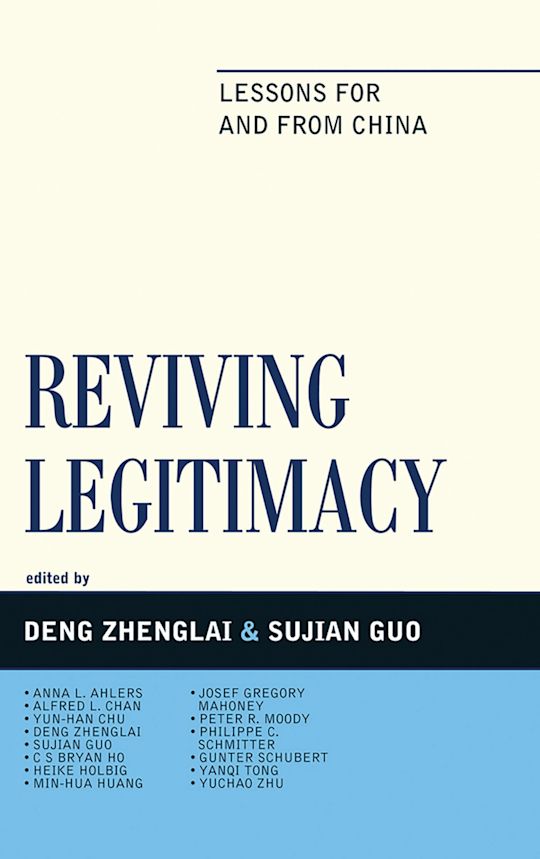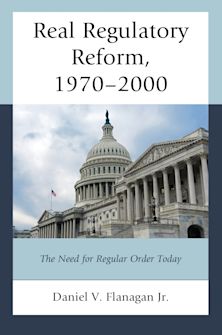- Home
- ACADEMIC
- Politics & International Relations
- American Government and Politics
- Reviving Legitimacy
Reviving Legitimacy
Lessons for and from China
Zhenglai Deng (Anthology Editor) , Sujian Guo (Anthology Editor) , Anna L. Ahlers (Contributor) , Alfred L. Chan (Contributor) , Yun-han Chu (Contributor) , Sujian Guo (Contributor) , C.S Bryan Ho (Contributor) , Heike Holbig (Contributor) , Min-hua Huang (Contributor) , Josef Gregory Mahoney (Contributor) , Peter R. Moody (Contributor) , Philippe C. Schmitter (Contributor) , Gunter Schubert (Contributor) , Yanqi Tong (Contributor) , Yuchao Zhu (Contributor)
Reviving Legitimacy
Lessons for and from China
Zhenglai Deng (Anthology Editor) , Sujian Guo (Anthology Editor) , Anna L. Ahlers (Contributor) , Alfred L. Chan (Contributor) , Yun-han Chu (Contributor) , Sujian Guo (Contributor) , C.S Bryan Ho (Contributor) , Heike Holbig (Contributor) , Min-hua Huang (Contributor) , Josef Gregory Mahoney (Contributor) , Peter R. Moody (Contributor) , Philippe C. Schmitter (Contributor) , Gunter Schubert (Contributor) , Yanqi Tong (Contributor) , Yuchao Zhu (Contributor)
For information on how we process your data, read our Privacy Policy
Thank you. We will email you when this book is available to order
You must sign in to add this item to your wishlist. Please sign in or create an account
Description
The Chinese government has attempted to bolster its legitimacy as a political response to emerging social, cultural, political, economic, environmental challenges and crises experienced during market-oriented reforms and rapid modernization in China. However, contrary to the Western preference for liberal democracy and "procedural legitimacy," the Chinese government's attempt at bolstering legitimacy has emphasized performance-based, responsibility-based, morality-based, and ideology-based arguments in order to gain popular support and maintain regime stability.
In order to understand and explain political phenomena in China, it is necessary to revisit the concepts, theories, and sources of legitimacy and their applications in the Chinese context. Contributors of this book have approached legitimacy from both normative and empirical perspectives, and from Western and Chinese perspectives, thus this edited volume offers lessons and insights for and from China, and contributes to the ongoing theoretical debates as well as empirical research on legitimacy in the Chinese context.
Table of Contents
Part 2 Part I. Legitimacy in Theoretical Perspectives
Chapter 3 Chapter 1. Typological Analysis of Democratic Legitimacy
Chapter 4 Chapter 2. What is Political Legitimacy and How can it be Acquired? Lessons from a Deviant Case
Chapter 5 Chapter 3. International Dimensions of Legitimacy: Reflections on Western Theories and the Chinese Experience
Chapter 6 Chapter 4. "Adaptive Authoritarianism" in Contemporary China: Identifying Zones of Legitimacy Building
Chapter 7 Chapter 5. Re-conceptualizing "Legitimacy" for Studying Village Elections in China
Part 8 Part II. Reviving Legitimacy in China
Chapter 9 Chapter 6. Confucianism as a Legitimizing Ideology
Chapter 10 Chapter 7. Legitimizing Leninism
Chapter 11 Chapter 8. Authoritarian Legitimacy and Legitimation in Contemporary China
Chapter 12 Chapter 9. "Performance Legitimacy" and China's Political Adaptation Strategy
Chapter 13 Chapter 10. Morality, Benevolence, and Responsibility: Regime Legitimacy in China from Past to the Present
Product details
| Published | 16 Sep 2011 |
|---|---|
| Format | Ebook (Epub & Mobi) |
| Edition | 1st |
| Extent | 226 |
| ISBN | 9780739168882 |
| Imprint | Lexington Books |
| Series | Challenges Facing Chinese Political Development |
| Publisher | Bloomsbury Publishing |
About the contributors
Reviews
-
This collection of essays sheds new light not just on the potential for democratic rule in China, but also on sources of legitimacy that do not fit neatly in the dichotomy between "good" democratic and "bad" authoritarian regime types. Highly recommended reading for anybody concerned about the theory and practice of Chinese politics and what it can offer to the rest of the world.
Daniel Bell, Tsinghua University (Beijing) and Jiaotong University (Shanghai)



































